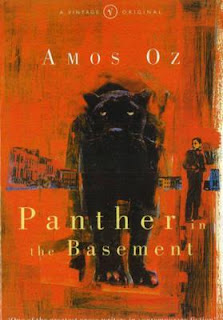Panther In The Basement
Panther In The Basement is a fictional remembrance by Amos Oz of what it was like in Jerusalem in 1947, before the Jewish state was born. British troops are in an occupational mode, setting curfews and playing the villain. Twelve-year-old Proffy (short for Professor) and a few of his friends have formed their own Underground, which they take deadly seriously. Proffy imagines shooting a rocket into Buckingham Palace. Proffy's parents are in a real Underground. His father is an intellectual who refers to England as "perfidious Albion."
As serious as some of this, Panther In The Basement is a charming reminiscence of childhood. Narrated by Proffy, he is at a delicate age. He has been accused of being a traitor by his organization because he has fraternized with a British soldier--they are teaching each other their respective languages. He claims that he has gained information from the soldier, but Ben Hur, who has accused him, claims, "Loving the enemy, Proffy, is worse than betraying secrets. Worse than betraying fighters. Worse than informing. Worse than selling them arms. Even worse than going over and fighting on their side. Loving the enemy is the height of treachery."
Proffy is also wracked with guilt over accidentally seeing his neighbor, an older girl, in a state of undress. When he learns that she is going to babysit for him, he thinks: "There's a pit inside the stomach that science hasn't discovered yet, and all the blood drained into that pit from my head, my heart, my knees, and turned into an ocean and roared like the ocean."
I loved this book, because it balances what must have been a fraught time with the wonders of childhood. Oz is able to bring us directly to the time and place: "This is how I remember Jerusalem in that last summer of British rule. A stone city sprawling over hilly slopes. Not so much a city as isolated neighborhoods separated by fields of thistles and rocks. British armored cars sometimes stood at the street corners with their slits almost closed, like eyes dazzled by the light. And their machine guns sticking out in front like pointing fingers: You there!"
He also has some brilliant similes, such as describing the British soldier, Sergeant Dunlop: "He looked like a man who once lost something very precious, and now he can't remember what it was he lost, what it looks like, or what he would do with it if he found it." Or describing the way Ben Hur talks: "Ben Hur used words like someone throwing gravel at a streetlamp."
Panther In The Basement serves as both an excellent look at life in Jerusalem before the creation of Israel, and a childhood reminiscence, and can be read for either or both.
As serious as some of this, Panther In The Basement is a charming reminiscence of childhood. Narrated by Proffy, he is at a delicate age. He has been accused of being a traitor by his organization because he has fraternized with a British soldier--they are teaching each other their respective languages. He claims that he has gained information from the soldier, but Ben Hur, who has accused him, claims, "Loving the enemy, Proffy, is worse than betraying secrets. Worse than betraying fighters. Worse than informing. Worse than selling them arms. Even worse than going over and fighting on their side. Loving the enemy is the height of treachery."
Proffy is also wracked with guilt over accidentally seeing his neighbor, an older girl, in a state of undress. When he learns that she is going to babysit for him, he thinks: "There's a pit inside the stomach that science hasn't discovered yet, and all the blood drained into that pit from my head, my heart, my knees, and turned into an ocean and roared like the ocean."
I loved this book, because it balances what must have been a fraught time with the wonders of childhood. Oz is able to bring us directly to the time and place: "This is how I remember Jerusalem in that last summer of British rule. A stone city sprawling over hilly slopes. Not so much a city as isolated neighborhoods separated by fields of thistles and rocks. British armored cars sometimes stood at the street corners with their slits almost closed, like eyes dazzled by the light. And their machine guns sticking out in front like pointing fingers: You there!"
He also has some brilliant similes, such as describing the British soldier, Sergeant Dunlop: "He looked like a man who once lost something very precious, and now he can't remember what it was he lost, what it looks like, or what he would do with it if he found it." Or describing the way Ben Hur talks: "Ben Hur used words like someone throwing gravel at a streetlamp."
Panther In The Basement serves as both an excellent look at life in Jerusalem before the creation of Israel, and a childhood reminiscence, and can be read for either or both.



Comments
Post a Comment